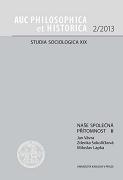Civilizační kolaps sociokulturních systémů: starověká římská říše a současná globální společnost
Civilizační kolaps sociokulturních systémů: starověká římská říše a současná globální společnost
Author(s): Barbora PůtováSubject(s): Social Sciences
Published by: Univerzita Karlova v Praze, Nakladatelství Karolinum
Summary/Abstract: The subject of this study is the issue of collapse of sociocultural systems as a specific kind of a cultural change. In this study I determine collapse as such, together with its basic features and mechanisms. The central category of the analysis is the phenomenon of complexity growth concerning sociocultural systems, which – as a secondary product of technological advancement – brings on one hand economic advantages and enables more feasible production of goods and services, but on the other hand it results into growth of entropy, manifestations of retardation and subsequent developmental regression. Paradoxically, as a consequence, the complexity growth changes into an indispensable necessity, which persists for reasons of securing inertial functionality of the society. Investments into complexity become more and more expensive and energy-intensive. Concomitant phenomena accompanying the complexity growth are surplus creation and ever decreasing profits. The scope of the study is to carry out an analysis of the complexity growth and collapse in the context of a wider range of interconnected demographic, economic, social, technologic and environmental factors. In the first part of the study I present sources and factors of collapse as a specific kind of a cultural change on the example of factors that caused the fall of the Western Roman Empire. In the second part the analysis focuses more on modern industrial societies and relative processes of economic integration and globalization. The crucial hypothesis is the statement that in current societies the threat of a collapse is linked to expansion of multinational companies. The study strives to contribute to theory of sociocultural change through culturological analysis of one of the most actual phenomena of the present time – complexity growth of the modern civilization.
Journal: Acta Universitatis Carolinae Philosophica et Historica
- Issue Year: XIX/2013
- Issue No: 2
- Page Range: 91-105
- Page Count: 15
- Language: Czech

